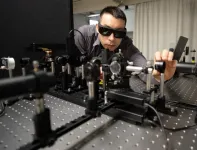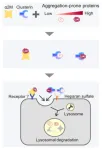(Press-News.org) An algorithm developed using artificial intelligence could soon be used by doctors to diagnose heart attacks with better speed and accuracy than ever before, according to new research from the University of Edinburgh, funded by the British Heart Foundation and the National Institute for Health and Care Research, and published today in Nature Medicine [1].
The effectiveness of the algorithm, named CoDE-ACS [2], was tested on 10,286 patients in six countries around the world. Researchers found that, compared to current testing methods, CoDE-ACS was able to rule out a heart attack in more than double the number of patients, with an accuracy of 99.6 per cent.
This ability to rule out a heart attack faster than ever before could greatly reduce hospital admissions. Clinical trials are now underway in Scotland with support from the Wellcome Leap, to assess whether the tool can help doctors reduce pressure on our overcrowded Emergency Departments.
As well as quickly ruling out heart attacks in patients, CoDE-ACS could also help doctors to identify those whose abnormal troponin levels were due to a heart attack rather than another condition. The AI tool performed well regardless of age, sex, or pre-existing health conditions, showing its potential for reducing misdiagnosis and inequalities across the population.
CoDE-ACS has the potential to make emergency care more efficient and effective, by rapidly identifying patients that are safe to go home, and by highlighting to doctors all those that need to stay in hospital for further tests.
The current gold standard for diagnosing a heart attack is measuring levels of the protein troponin in the blood. But the same threshold is used for every patient. This means that factors like age, sex and other health problems which affect troponin levels are not considered, affecting how accurate heart attack diagnoses are.
This can lead to inequalities in diagnosis. For example, previous BHF-funded research has shown that women are 50 per cent more likely to get a wrong initial diagnosis. People who are initially misdiagnosed have a 70 per cent higher risk of dying after 30 days [3]. The new algorithm is an opportunity to prevent this.
CoDE-ACS was developed using data from 10,038 patients in Scotland who had arrived at hospital with a suspected heart attack. It uses routinely collected patient information, such as age, sex, ECG findings and medical history, as well as troponin levels, to predict the probability that an individual has had a heart attack. The result is a probability score from 0 to 100 for each patient.
Professor Nicholas Mills, BHF Professor of Cardiology at the Centre for Cardiovascular Science, University of Edinburgh, who led the research, said:
“For patients with acute chest pain due to a heart attack, early diagnosis and treatment saves lives. Unfortunately, many conditions cause these common symptoms, and the diagnosis is not always straight forward. Harnessing data and artificial intelligence to support clinical decisions has enormous potential to improve care for patients and efficiency in our busy Emergency Departments.”
Professor Sir Nilesh Samani, Medical Director of the British Heart Foundation, said:
“Chest pain is one of the most common reasons that people present to Emergency Departments. Every day, doctors around the world face the challenge of separating patients whose pain is due to a heart attack from those whose pain is due to something less serious.
“CoDE-ACS, developed using cutting edge data science and AI, has the potential to rule-in or rule-out a heart attack more accurately than current approaches. It could be transformational for Emergency Departments, shortening the time needed to make a diagnosis, and much better for patients.”
ENDS
To request interviews or for more information please call the BHF press office on 020 7554 0164 or email newsdesk at newsdesk@bhf.org.uk.
Notes to editors
[1] - Machine learning for diagnosis of myocardial infarction using cardiac troponin concentrations. Nature Medicine 2023. DOI: 10.1038/s41591-023-02325-4. URL: https://www.nature.com/articles/s41591-023-02325-4
[2] - CoDE-ACS stands for Collaboration for the Diagnosis and Evaluation of Acute Coronary Syndrome. https://decision-support.shinyapps.io/code-acs/
[3] – These statistics are taken from the BHF report Bias and Biology: https://www.bhf.org.uk/-/media/files/heart-matters/bias-and-biology-summary.pdf?rev=56108ca8e3564073a4ce42c67c513bc2&hash=52C880653E113A405B241318664D7022
About the British Heart Foundation
It is only with donations from the public that the BHF can keep its life saving research going. Help us turn science fiction into reality. With donations from the public, the BHF funds ground-breaking research that will get us closer than ever to a world free from the fear of heart and circulatory diseases. A world where broken hearts are mended, where millions more people survive a heart attack, where the number of people dying from or disabled by a stroke is slashed in half. A world where people affected by heart and circulatory diseases get the support they need. And a world of cures and treatments we can’t even imagine today. Find out more at bhf.org.uk
END
FOR IMMEDIATE RELEASE
SpaceMarkers, a new machine learning software developed by researchers at the Johns Hopkins Convergence Institute and the Johns Hopkins Kimmel Cancer Center, can identify molecular interactions among distinct types of cells in and around a tumor.
SpaceMarkers harnesses the information available through spatial transcriptomics — a cutting edge technology advancing the ability to measure gene expression in tissue samples based on their location in cells. Understanding the molecular profile of individual cells and the impact of intercellular interactions in the tumor microenvironment (cells ...
Obstructive sleep apnea associated with increased risks for long COVID
Study suggests adults with both the sleep disorder and COVID may benefit from clinical monitoring
Among people who have had COVID-19, adults with obstructive sleep apnea were more likely to experience long-term symptoms suggestive of long COVID than those without the sleep disorder, according to a large study supported by the National Institutes of Health (NIH). In fact, multiple analyses of electronic health records (EHR) identified adults with sleep apnea may have up to a 75% higher risk ...
The senses represent our gates to receive information from the environment, but not all of them are always available for everyone, as in the case of blind or deaf people. Researchers know today quite well that the brain has the critical ability to adapt to different sensory experiences and, in some ways, to “compensate” for the lack of one sense or the other.
In a recent study, a group of researchers from the IMT School for Advanced Studies Lucca (Italy), in collaboration with a group from the University of Ulm (Germany), ...
New lens analysis approach could improve treatments for nearsightedness
Instrumentation recreates properties of the myopic eye to test lenses that prevent visual decline
WASHINGTON — Researchers have developed new instruments for rigorously quantifying and comparing the light focusing properties of specialized eyeglass lenses that are used to slow the progression of myopia, or nearsightedness. The information gained with this new approach could help inform future lens designs that are even more effective at preventing visual decline.
Nearsightedness is on the rise around the globe, especially among children. If current trends continue, ...
The freely available compliance checker will use natural language processing to automatically assess scientific manuscripts for the information in the ARRIVE Essential 10, a checklist of the most important details to include in any publication describing animal research.
A major factor influencing the reliability and reproducibility of animal experiments is how transparently they are reported. The ARRIVE guidelines help researchers improve the reporting of animal studies by clearly laying out the information that should be included in a manuscript. Reporting animal experiments in line with the ARRIVE guidelines is a requirement ...
The Louisiana Cancer Research Center (LCRC) is stepping up its statewide efforts to reduce the state’s extraordinarily high cancer rates by enlisting the help of the public and communities. The LCRC’s newly established Office of Community Outreach and Engagement (OCOE) is convening an all-day “Promising Practices Conference” on Friday, June 2 at Louisiana Tech University and online to highlight the resources and assistance that are available to support better health and wellness throughout Louisiana and strategize on ways to overcome challenges. There is no charge to attend the conference, which is presented by the LCRC in collaboration with ...
In a recent study, researchers determined that derivatives of natural emulsifiers such as phospholipids found in high-fat, high-cholesterol diets can promote atherosclerosis via gut bacteria interactions with the immune system. This study could pave the way for targeted interventions for individuals who are at risk for developing heart disease.
Obesity and a high-cholesterol, high-fat diet are both well-established risk factors for atherosclerosis. In fact, obese individuals are two and a half times more likely to develop heart disease. ...
The common ragweed plant (Ambrosia artemisiifolia) has spread rapidly in Europe and has intensified the pollen season for many allergy sufferers. Now the plant has arrived in Norway.
Common ragweed can extend Norway's pollen season into November, but fortunately the species is struggling in this country.
“Common ragweed can be found in Norway, but for now it has no stable populations,” says Vanessa Carina Bieker, a postdoc at the Norwegian University of Science and Technology's (NTNU) ...
Proteins tend to fold wrongly and become defective when exposed to stressors such as heat, oxidation, and pH changes. Accumulation of abnormal proteins contributes to neurodegenerative diseases like Alzheimer’s.
So, how does the human body deal with such misfolded or defective proteins? It regulates protein networks via a process called ‘proteostasis,’ which prevents protein aggregation and any damage that may result from misfolded protein accumulation inside (intracellular) or outside (extracellular) cells. A set of unique proteins—molecular chaperones—play an essential role in proteostasis: they target and interact with misfolded proteins, maintain their solubility, ...
Short-term therapy sessions with parents and their children in homeless shelters could help improve parenting skills and reduce parental stress and children’s post-traumatic stress symptoms, according to a pilot study published by the American Psychological Association.
Researchers from Florida International University partnered with Lotus House in Miami, one of the largest women’s homeless shelters in the U.S. The study included 144 families (mother and one child) with children from 18 months to 5 years of age. The research was published online in the Journal ...






